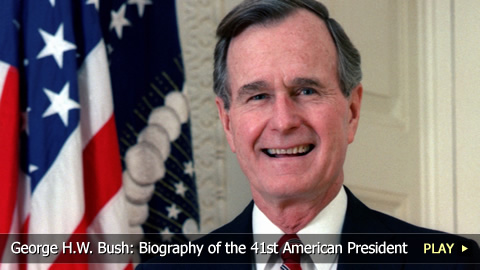George H.W. Bush: Biography of the 41st American President

He is known as “Papa Bush” or “Bush the Elder.” Welcome to WatchMojo.com, and today we’ll be learning more about the life and accomplishments of George H.W. Bush.
George Herbert Walker Bush was born June 12th, 1924 in Milton, Massachusetts, to Prescott Sheldon Bush and his wife Dorothy. Raised in a politically-inclined and affluent household, Bush was sent to a select Massachusetts boarding school where he assumed leadership roles like senior class president and varsity team captain.
Bush delayed his college plans after 1941’s Pearl Harbor attack. Instead, he enrolled in the U.S. Navy, where he became the youngest pilot to that point. During his stint, Bush almost died when his plane was bombed over the Pacific. He returned to the States, where he married Barbara Pierce and earned an honorable discharge in 1945.
He soon finished his education at Yale by earning a BA in economics in two-and-a-half years. At school, he joined teams and organizations, including the famous secret society, Skull & Bones. The Bush family also welcomed the first of their six children, George Walker.
Following Bush Sr.’s 1948 graduation, the family relocated to Texas where he joined the oil industry and quickly made his millions. By 1964, he was more interested in politics than business.
Bush aimed for a state senate seat. But his Democratic opposition painted him as a conservative fanatic, and he lost. Two years later, he began a two-year term in the House of Representatives, where he commonly upheld right-wing interests, but did vote in favor of 1968’s Civil Rights Act. Bush also supported Nixon’s Vietnam strategy, and voted to abolish the draft as a House Ways and Means Committee member.
After another failed senate run in 1970, Bush jumped from Ambassador to the United Nations to head of the Republican National Committee. Nixon successor Gerald Ford then made Bush an official envoy to China. His success there led to his appointment as head of the Central Intelligence Agency in 1976, but he left when Democrat Jimmy Carter took office the next year.
Bush stood out as a candidate for the Republican presidential ticket in 1980, but he lost to Ronald Reagan after a fierce campaign. The conservative Reagan then chose the moderate Bush as his running mate, and the pair won the election.
As vice president, Bush headed important task forces and supported Reagan in his policy decisions. He became the first VP to become acting president when Reagan underwent colon surgery in July 1985. By then, Bush had decided to run for president in 1988.
In 1986, the Reagan administration was tarnished by the Iran-Contra scandal. Bush did not allow this to derail his presidential dreams: he and Dan Quayle fought a nasty campaign against Democrat Michael Dukakis. After a memorable speech at the ’88 Republican National Convention, Bush became the first sitting vice president since 1836 to be elected. On January 20th, 1989, George H.W. Bush was inaugurated the 41st President of the United States.
Bush’s presidency included foreign policy issues like the fall of the Berlin Wall, the collapse of the Soviet Union, intervention against Panamanian leader Manuel Noriega, and the launch of the Gulf War against Iraq and Saddam Hussein.
At home, Bush signed the North American Free Trade Agreement and the Americans with Disabilities Act. However, his approval rating plummeted to 34 percent after he backtracked on his promise of no new taxes.
This, in addition to his reputation as out-of-touch, meant Bush did not win reelection in 1992 against Bill Clinton.
Bush and his wife then retired to Houston, Texas, where he wrote several books. He supported his sons’ political aspirations, and was proud when Jeb became Florida governor in 1999 and George became the 43rd president in 2001. Bush Sr. later paired with former rival Bill Clinton to raise funds for U.S. disaster relief, and was awarded an honorary knighthood by Queen Elizabeth II as well as the Medal of Freedom by President Barack Obama.
Though George H.W. Bush’s legacy was blighted by a recession, his skill as a foreign policy leader endured. Above all, his embodiment of traditional American values earned him praise from both sides of the political spectrum.
Sign in
to access this feature
